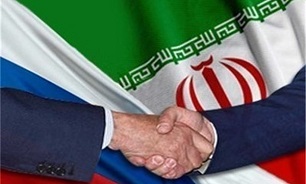Iran, Russia Survey Shared Campaign against Terrorism
 The meeting was held between Islamic Revolution Guards Corps (IRGC) Deputy Commander for Coordination Rear Admiral Ali Fadavi and Deputy Chief of the Russian Army General Staff Vice-Admiral Igor Osipov in Tehran on Wednesday.
The meeting was held between Islamic Revolution Guards Corps (IRGC) Deputy Commander for Coordination Rear Admiral Ali Fadavi and Deputy Chief of the Russian Army General Staff Vice-Admiral Igor Osipov in Tehran on Wednesday.
During the meeting, the two sides underlined the need for the further broadening of Tehran-Moscow cooperation, specially in military fields, in accordance to the requirements of the regional security conditions and interventions of foreign and trans-regional states.
They also described achievements of cooperation between Tehran and Moscow in the fight against terrorism and regional threats as one of the many areas of mutual cooperation, and exchanged view on enhancement of cooperation in security, industrial, research and training fields.
General Fadavi and General Osipov underlined that the defeat of the Takfiri terrorism in Syria has been the product of the strategic cooperation between the two countries' Armed Forces in assisting the resistance front, responding to the Syrian government's request for help and joint management of the battle scene.
On Monday, a delegation of the Russian defense ministry led by General Osipov arrived in Iran to take part in a second session of the Russian-Iranian working group for the implementation of a mutual agreement on military cooperation.
The agreement was signed in January 2015. It was inked by Russian Defense Minister Sergey Shoigu and his then Iranian counterpart General Hossein Dehqan.
The Russian minister said back then that the agreement had laid "the theoretical groundwork for military cooperation".
In relevant remarks on Tuesday, Chief of Staff of the Iranian Armed Forces Major General Mohammad Hossein Baqeri underlined the need for Tehran and Moscow to further increase their military cooperation, adding that both countries were determined to confront existing threats.
"Success of the two countries' Armed Forces in the process of confronting terrorism in Syria and the failure of Takfiri terrorists and their supporters in the region indicates Iran and Russia's will and capacities to confront the existing threats," General Baqeri said in a meeting with General Osipov in Tehran.
"The geopolitical and geostrategic capacities of Iran and Russia necessitate the two countries' Armed Forces to devise and develop fields of cooperation through a long-term view, and manage and plan for them within the framework of the agreements made by the joint military commission," he added.
During the meeting, General Osipov referred to the age-old relations between Iran and Russia, and stressed the abundant areas and capacities existing for mutual cooperation.
Message end/
